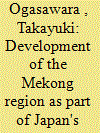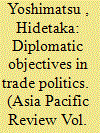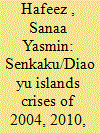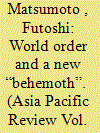|
|
|
Sort Order |
|
|
|
Items / Page
|
|
|
|
|
|
|
| Srl | Item |
| 1 |
ID:
138749


|
|
|
|
|
| Summary/Abstract |
China has rapidly emerged as a global power in recent years. If Japan and the US are required to counter the rise of China, long-term strategies will be essential. This article presents an overview of the development of China's military capabilities, provides an overview of the problems that Japan and the US face, and explores the question of what kinds of strategies Japan and the US will require, based on the two concepts of “denial” and “cost imposition.” Then, examples of “denial” or “cost imposition” measures that Japan and the US are capable of adopting are given together with points to consider when employing such strategies. The article recommends that Japan and the US immediately start constructing long-term strategies that give serious weight to the possibility that, eventually, the two countries may fall into a position in the region that is weaker than that of China.
|
|
|
|
|
|
|
|
|
|
|
|
|
|
|
|
| 2 |
ID:
138748


|
|
|
|
|
| Summary/Abstract |
Japan's active engagement in the development of the Mekong region since the 1990s needs to be understood not only from an economic but also from a diplomatic perspective. Japan seeks to collaborate with ASEAN in facilitating multilateral “political dialogue” in the Asia-Pacific region and building an East Asian order based on “universal values” such as democracy and the rule of law, and the Mekong region could be the “weakest link” of ASEAN. After outlining Japan's twenty-year undertaking to cultivate Mekong-Japan cooperation, the author suggests that it is time to broaden the scope of the cooperation and accelerate Japan's “proactive contribution to peace” policy to cope with the changing security environment.
|
|
|
|
|
|
|
|
|
|
|
|
|
|
|
|
| 3 |
ID:
138751


|
|
|
|
|
| Summary/Abstract |
This article seeks to analyze the development of free trade agreement (FTA) policies adopted by China, Japan, and South Korea with particular interests in the trilateral FTA. It seeks to address what the determinant factors that have conditioned the development of the trilateral FTA are. While the three governments began the informal joint study of the trilateral FTA in 2003, they pursued diverse trade strategies that disturbed a shift to formal negotiations. However, China's strategy to hedge against the US influence in East Asia became a catalyst in shifting from the long-lasting study stage to the launching of negotiations. Moreover, Japan's strategy to participate in TPP negotiations as a soft balancing against China through closer political linkages with the United States weakened China's and South Korea's willingness to engage in the trilateral FTA positively. Thus, the three countries’ commitments to the trilateral FTA were primarily confined by their specific diplomatic objectives responding to the political-economic evolutions in the Asia-Pacific region.
|
|
|
|
|
|
|
|
|
|
|
|
|
|
|
|
| 4 |
ID:
138752


|
|
|
|
|
| Summary/Abstract |
This article explores how the Abe administration might go about improving Japan's relationship with the South Korean government of President Park Geun-hye. Although bilateral ties are strained by disagreements over history, territory, and the “comfort women” issue, as well as mutual mistrust and “fatigue,” the paper argues that the two sides actually share substantial interests in common and urges Japanese leaders not to lose hope but to continue working hard to improve relations. It lays out a menu of policy “options” across political-diplomatic; security; economic; educational and socio-cultural; and environmental and scientific domains, and describes a strategy for how to build a better relationship over the next several years.
|
|
|
|
|
|
|
|
|
|
|
|
|
|
|
|
| 5 |
ID:
138750


|
|
|
|
|
| Summary/Abstract |
The diplomatic situation between Japan and China over the Senkaku/Diaoyu Islands has become increasingly precarious over the past decade. Weak diplomatic ties and lack of trust between the two nations has made a clash not only more likely, but also unlikely to be effectively contained. This article compares the events and management of three diplomatic crises concerning the islands, including the deportation of Chinese activists who landed on the islands in 2004, the detention of a Chinese fishing boat captain who collided with a Japan Coast Guard vessel in 2010, and the 2012 nationalization of three of the islands by the Japanese central government. These case studies reveal the lack of reliable high-level communication mechanisms between Tokyo and Beijing, diminishing back-channel diplomacy and the asymmetrical influence of each respective Foreign Ministry as just a few of the structural barriers to effective Sino-Japanese crisis management.
|
|
|
|
|
|
|
|
|
|
|
|
|
|
|
|
| 6 |
ID:
138753


|
|
|
|
|
| Summary/Abstract |
A nuclear debate has arisen in South Korea following North Korea's nuclear tests and weapons program. Despite the US extended nuclear deterrence for its security, a sizable section of the people in South Korea have started debating if their country can revisit the nuclear option as a deterrent to North Korea's continued threats. Several law makers have started articulating such a view. Several opinion polls held recently also endorse such a view. However, the US is unlikely to allow South Korea to take the nuclear path as it would have serious consequences not only for the region but also the world. China would also not rejoice with the prospect of having another nuclear power in its neighborhood. If South Korea goes nuclear, Japan and Taiwan will find it difficult to resist having their own nuclear weapons. To stem such a trend, it becomes all the more necessary for the international community to address the issue of denuclearizing North Korea. The suspended Six-Party-Talks ought to restart soon and China has a great role in reigning in Pyongyang. Fortunately, the government in South Korea has not supported the view of the country going nuclear. But if the security situation deteriorates further, it might become irresistible for the government to have a rethink, with an inevitable domino effect in Japan and Taiwan soon. This article makes an in-depth study of the prevailing trend in South Korea, the views of some influential law makers pleading for the country to go nuclear, various public opinions polls, possible US stance and implications that such a change in policy would have on the region's security situation and the author's assessment based on the critical examination of the above-mentioned factors. Many sources have been cited to analyze this issue before arriving at an objective assessment of the point raised in this essay.
|
|
|
|
|
|
|
|
|
|
|
|
|
|
|
|
| 7 |
ID:
138746


|
|
|
|
|
| Summary/Abstract |
The Obama administration is often criticized for not having a strategic vision. After more than six years in office, a high expectation that was widely shared around the globe seems to have nearly evaporated. Many see the “disorder” the world is facing today as partly a result of a lack of vision from the White House. You could make a case that the emergence of the Islamic State (IS) and other “violent extremism” in the Middle East and beyond, Russia's aggression in Ukraine, chaos in Syria, China's assertive moves in the East China Sea and South China Sea, and so forth, are results, direct and indirect, of a perceived vacuum created by “American withdrawal.” However, the Obama administration's understanding of the world has been surprisingly positive and constant. This paper will argue that Obama administration in fact has a core world view, based on a new self-image of the United States, and that the issue is not whether the administration lacks a vision; rather the focus should be on the vision itself and the execution of that vision.
|
|
|
|
|
|
|
|
|
|
|
|
|
|
|
|
| 8 |
ID:
138747


|
|
|
|
|
| Summary/Abstract |
It is not easy to say what proportion of Hong Kong residents support democratization. Although the overwhelming majority of Hong Kong people support universal suffrage of the chief executive, public opinion in Hong Kong is divided into two opinions about whether they should accept the Chinese-style of democracy in which candidates are selected before election by the Chinese Central Government to exclude pro-democracy camp candidates. The majority of Hong Kong citizens do not want a person from the pro-democracy camp who is not on good terms with the central government to become the chief executive, and the “Occupy” movement was not welcomed because of prolonged occupation of the major streets. It is not easy for the pro-democracy camp to persuade conservative ordinary people to support full-democracy, and even if they succeed in changing public opinion, the central government and mainland people will become the next obstacle. The future perspective of Hong Kong's democratization is not bright, but young people's demand for democracy is very strong and they may well change Hong Kong society. It may also be possible that a wave of political consciousness among the young could eventually also sweep mainland China.
|
|
|
|
|
|
|
|
|
|
|
|
|
|
|
|
| 9 |
ID:
138754


|
|
|
|
|
| Summary/Abstract |
The emergence of “Islamic State” or “Daesh”1 as abbreviation of “Islamic State in Iraq and al-Sham” in Arabic now poses a strategic challenge to the international community. Given a number of emerging issues such as “war” in the eastern states of Ukraine and assertive actions of China in East Asia, it requires a sober reflection on strategic thinking before embarking upon any tactical and operational measures vis-à-vis these challenges. This article treats the critical value of the Westphalian order based on a sovereign state system by distinguishing three challenges we face at this juncture: namely Daesh, Russia, and China and suggests ways to fight Daesh from a strategic point of view.
|
|
|
|
|
|
|
|
|
|
|
|
|
|
|
|
|
|
|
|
|